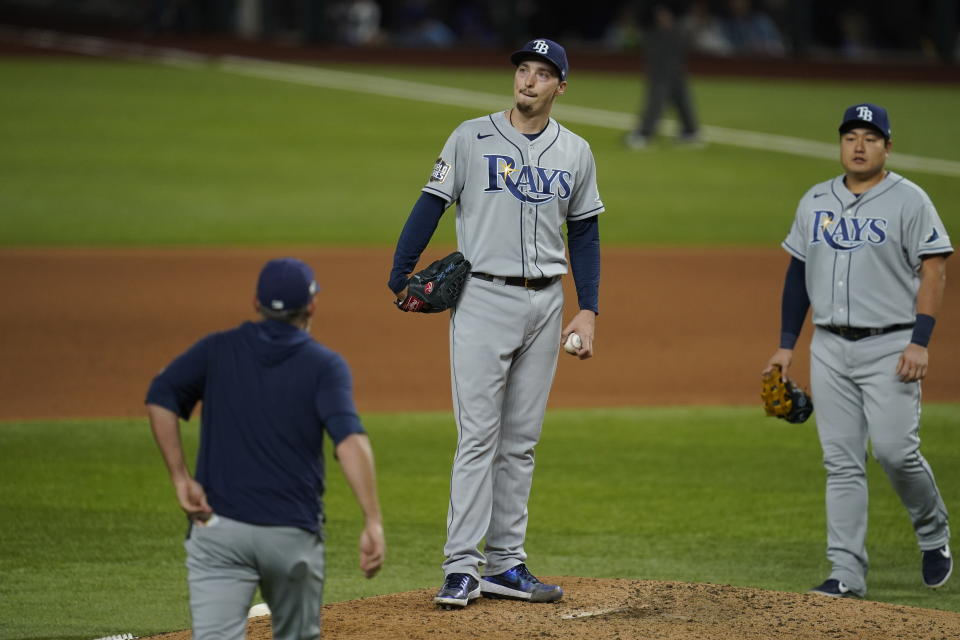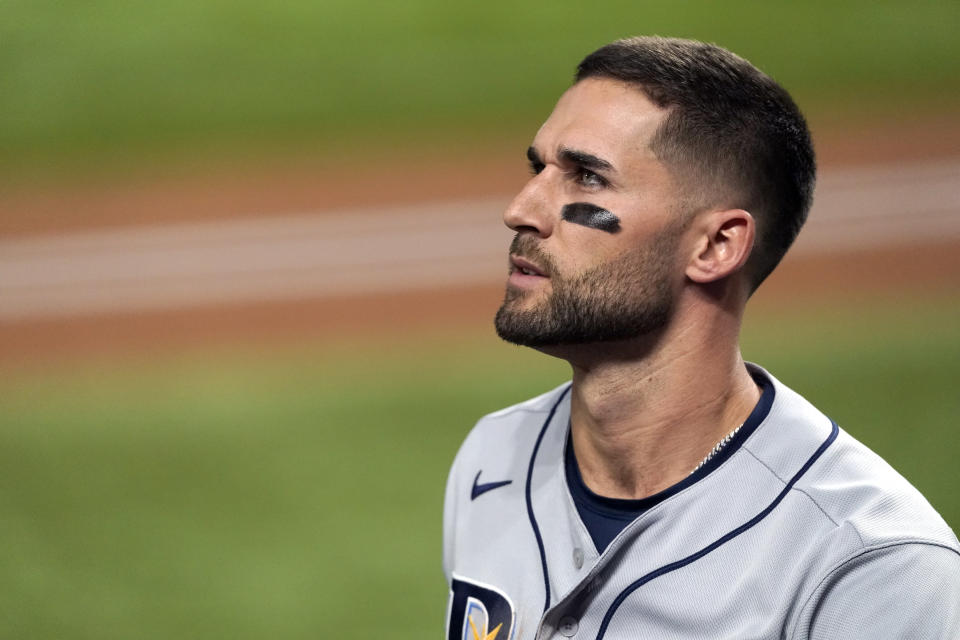How to remember the Rays, and the Blake Snell decision that ended their World Series hopes
If you’re a Tampa Bay Rays fan — even if you’re not, probably — what you’ll remember from the end of the 2020 World Series is the decision to pull Blake Snell.
(Plus, you know, the coronavirus and the surreal circumstances that couldn’t be ignored long enough for the winning team to even celebrate, because pandemics are inconvenient like that.)
Like an avatar or a devil’s advocate for the way modern baseball seems designed to alienate at least a certain segment of fans, Rays manager Kevin Cash emerged from the dugout after 5 ⅓ innings to pull his pitcher, who had a 1-0 lead on 73 pitches.
“It was kind of a sigh of relief,” Mookie Betts said. He and the rest of the Dodgers’ lineup seemed to be the only people excited about the move.
Snell had struck out nine and allowed only two baserunners. He felt comfortable, locked in, like he was able to make real-time adjustments to the Dodgers’ powerful hitters. He was pitching one of the best games of his career at the exact right moment: Game 6 of the World Series, with his Rays facing elimination.
Repeatedly throughout the postseason, Snell had reaffirmed that his manager knows best. Those tactical decisions — whether made by Cash, or the front office, or a combination — got the team to the World Series, after all.
But Snell couldn’t hide his frustration and even fury storming off the mound in his 21st consecutive start without finishing six innings. If the game had ended there, or the bullpen could have kept it there, the Rays would have forced a Game 7. Instead, six pitches later, the Dodgers were leading 2-1 en route to a 3-1 victory and their first championship in 32 years.

‘There’s no set plan’
So that decision, which had seemed cold and antithetical to the nostalgic spirit of the sport in the moment, suddenly looked far worse. In a one-run game, Cash gave the ball to Nick Anderson, who went on to set a postseason record by allowing at least one run in his seventh straight relief appearance.
“We have a certain formula for how we try to win ballgames,” Kevin Kiermaier, the unofficial captain of the team, said postgame. By that he means not allowing starting pitchers to face the opposing lineup a third time through.
“We know how everything works, analytics is a huge part of our success,” Kiermaier said. And that’s true, although not as unique to the Rays as binary narratives might make it seem, especially not in a series against a Dodgers team built by a former Rays GM.
Kiermaier was clear that he disagreed with the decision — calling it “Blake’s game to lose” — but remained diplomatic about the overall strategy. “Kevin Cash, our front office, they put together a certain game plan and they’ve been right time and time again.”
Except, Cash himself disagreed. Not about being right — although he did say he regretted the decision now that he knew it didn’t work — but about there being a plan in the first place.
“As much as people think that sometimes, there’s no set plan,” he told reporters. “This organization is tremendous about giving the staff the trust to make the in-game decisions that we feel are going to give us the best chance to win.”
Managers do that in these situations, deflect the implication that their in-game moves are directed by analytics or suits. It’s part of the pageantry of reducing what is likely careful, nuanced collaboration to something with clearer characters. But in this case, Snell was so demonstrably dominant that if this wasn’t the plan, what was it? If they didn’t enter the game intending to pull Snell at a particular juncture, why did they pull him when they did?
Asked if there was anything his ace could have done to earn the opportunity to keep pitching, Cash was stumped.
“It’s a good question, a tough question, and I don’t know if I have the best answer,” he said.

Rays players don’t fit in tidy narrative box
It’s an unsatisfying answer because it was an unsatisfying result. There’s no satisfaction in losing, even righteous or smug. The Rays who sat dutifully for Zoom interviews tried to answer for a decision that was already answered by the Dodgers’ celebration on the field.
Besides, you won’t remember what they said anyway, you’ll just remember that they lost.
Hopefully, though, you’ll remember the end of Game 4, too. Maybe Manuel Margot’s attempt to steal home in Game 5. The October of Randy Arozarena, who could make a case for World Series MVP even though the team came up short. You’ll forget the fact that the rest of the Rays offense didn’t do enough, frankly, because that doesn’t fit with the storyline of Cash’s Boner and it’s sort of covered by the losing anyway.
Hopefully you’ll remember that they played well and it was a good series, a good team, too.
At some point over the past month, as people watched the talented, likable, not-superstar-heavy Rays advance through the postseason, savvy writers and fans started to grow concerned that their success would be bad for baseball. An oversimplified version of the entire discourse goes a little something like this: If the Rays could achieve baseball’s ultimate goal with the league’s third-lowest payroll, owners would be all the more disincentivized to splurge on household names.
This is a completely reasonable concern. Owners love to spend less if they can get away with it, and World Series championships often beget tactical trends (see: the rebuild). More generally, the use of Moneyball-esque analytics to slash payroll without sacrificing wins is an entrenched feature of modern baseball that has been steadily remaking the game for decades.
To root for the Rays, then, would be inherently anti-labor. Their failure is a boon for the sport.
Except, I can’t shake the feeling that this is just another iteration of treating the players themselves like interchangeable pawns in a game of front-office chess.
Rooting for players who are underpaid, or at least paid less, to come up empty simply doesn’t feel very pro-labor on an immediate level. Why is wanting them to justify their (comparatively) small salaries better than wanting them to outperform them? Maybe it’s the economic precarity outside the baseball diamond that has made me more sensitive to this — it’s not all ideology and moral high ground.
Often, especially if they’re cheap, baseball players literally don’t have agency. Arozarena can’t test the free market value for his labor for the next six years. He can’t take his talents to the Dodgers no matter how much they’re willing to pay him or whether he would prefer to lend his power and speed to their cause. Even Snell, who has both achieved some degree of agency and absolute riches, has only Rays jerseys in his locker.
That’s not to imply some sort of aspirational mutiny or to sow drama where there is none. Even in the wake of a questionable decision by management, Kiermaier insisted they “win as a team and lose as a team,” and I believe him — I just think he’s talking about his actual teammates and not the overarching reputation necessitated by a tight budget.
If this season has taught us anything, it’s that the players are more people than they are laundry hangers or manifestations of front-office mentality. Hopefully that’s what we remember.
More from Yahoo Sports:

 Yahoo Finance
Yahoo Finance 
